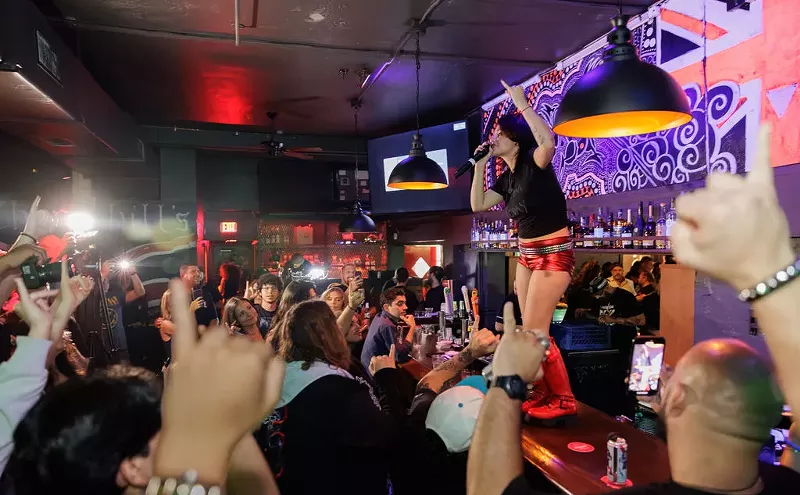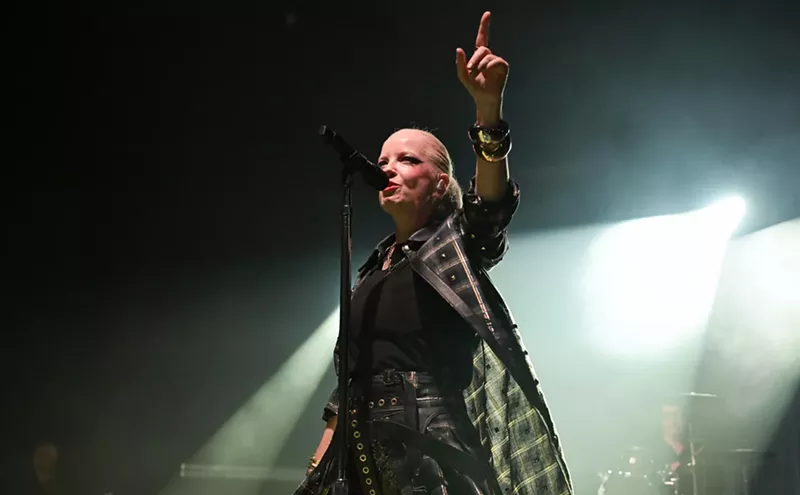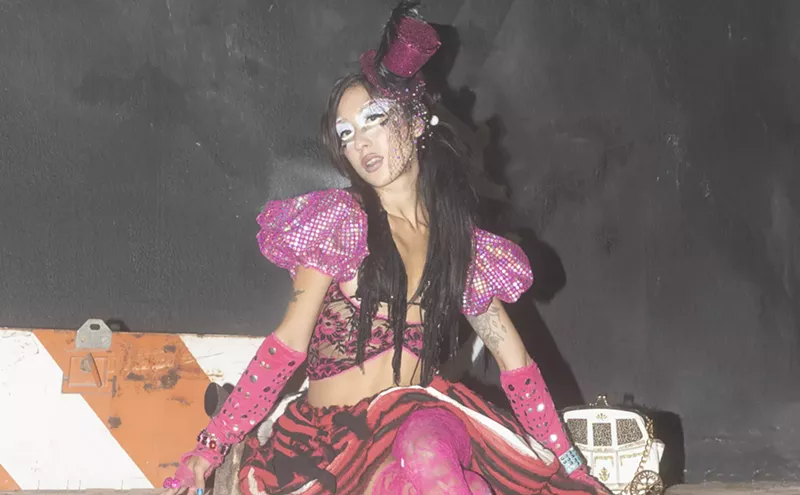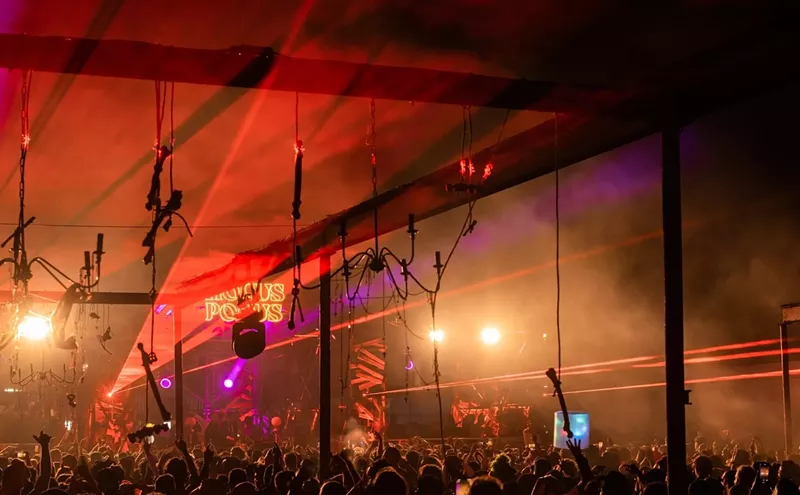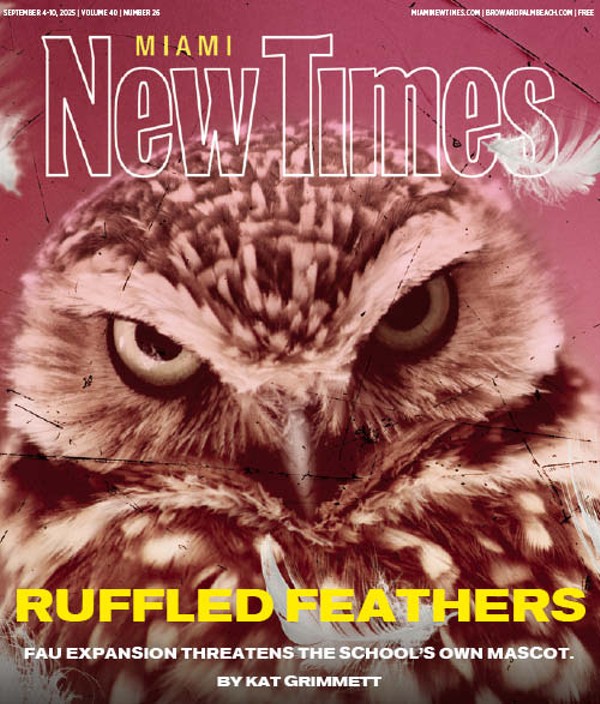Essex, England-birthed five-piece Modern English boasts a legacy that's pretty much the reverse of its '80s post-punk peers.
Where similar outfits enjoyed serious commercial success in their homeland but only cult-band status in the U.S., frontman Robbie Grey and Modern English achieved the opposite.
While they dutifully worked the club and theater circuit against the crowded backdrop of the New Wave scene, their star rose meteorically in the United States.
See Also:
-Modern English: Stop the World and Melt With Miami at Grand Central on September 28
-Flock Of Seagulls' Mike Score Talks New Wave Hair and Aliens
-Flock of Seagulls, New Wave Hooks, and Big-Ass Hair at Grand Central, May 11
These were the days when radio DJs were actually allowed to choose and introduce new songs, and a few clued-in jocks picked up on "I Melt With You" as an import. The song spread virally from station to station, and the rest is '80s nostalgia history, with the song blowing up into one of those slightly mournful stabs of synth-rock that came to define the decade. Meanwhile, though the song also played well back in the U.K., it never achieved the same kind of commercial lift-off there.
As smooth and undeniably chart-worthy that song was, though, much of the rest of Modern English's output sounded notably artier. The earliest material definitely tore a page from the Joy Division book, but as the years went on, the group struck a very New Wave balance between synth and technology trickery and real songwriting.
Casual fans might be surprised to know that's gone on more or less continuously since the group's heyday, with frontman Robbie Grey continuing to release new music under the Modern English name. However, the past year remarks the band's official return to form, with almost all of the original lineup now reassembled: Gary McDowell on keyboards, Michael Conroy on bass, and Stephen Walker on keyboards. (The only replacement is Rick Chandler, on drums.) Together, the group is working on a new album, with plans to record in the days following its Florida mini tour, which lands at Grand Central on Friday.
We here at Crossfade caught up with frontman Robbie Grey to chat about songwriting, the early days of New Wave, and the band's possible future plans. Here's what he had to say.
Crossfade: Coming from a younger American perspective, it seems like a lot of the bands who were your peers had the opposite situation you did. They were big back in the U.K., but they were considered underground or college bands in the States. How do you think that worked out for you all?
Robbie Grey: That's very true. Very true. But it was "I Melt With You." Taking a band like Echo and the Bunnymen, they'd play maybe New York, L.A., and Chicago. But they wouldn't be able to play Kansas City or maybe even in Florida. I don't know why that was. You just get Anglophile pockets of people in the cities.
But we were played a lot more on the radio than our peers at the time -- we were mainstream. And "I Melt With You" is still everywhere; it's incredible. I don't think any of those bands had that type of song.
You mentioned earlier that you still feel the punk ethos in your music. The early stuff was very post-punk, very Joy Division-sounding, and then it got more polished and synth-based. Were you consciously trying to shift to writing pop records?
Well, the main thing was learning our instruments. We couldn't really play when we first started. We also recorded our first album, Mesh and Lace, ourselves too, with an engineer. That's still my favorite album, by the way.
But then we got teamed up with Hugh Jones who produced Heaven Up Here by Echo and the Bunnymen. With After the Snow, the title track on that record was the first song I didn't shout on. He got me to stop shouting and just kind of talk into the microphone, making it more personable. He showed us the craft of songwriting, even though we weren't looking for it.
I wouldn't say we were synthesizer-heavy. We've always thought of ourselves as a guitar band with keyboards. We weren't looking to be commercially successful. It was literally thrust upon us, and we didn't know it was going to happen.
How was it thrust upon you exactly?
Well, when "I Melt With You" started getting radio play in America, it was as an import. One commercial radio station played it, and then another, and then another. It wasn't even released in the States. It wasn't a normal thing to be happening on mainstream radio, but then every record label in America wanted to sign Modern English. Back in England, we were on 4AD Records -- a very underground, very hip label. To have this mainstream thing happen overnight was not what we expected.
Who was Patient Zero in the States for the song?
I don't know. It just caught the imagination. I didn't think they would be able to play it when it was unreleased, but they did.
When you were writing the song, did you have any sense you were sitting on a potentially massive pop hit? Did your label back in the U.K. react as such?
I suppose we knew when we were listening to the album as a whole that it was the most commercial-sounding song on there, the most upbeat. We never thought we'd make a career out of it! Even today we're being used on Hershey bar adverts and whatever else from that song.
What is it like to play it every night on tour after playing it for 30 years?
I'm not going to knock it, because every night the crowd goes mad! When you go onstage as a band, you want people to enjoy the music, and they do. So for me, it's not a problem to play "I Melt With You."
You said your first album is your favorite, Mesh and Lace. Why that one?
I suppose just because of how the band was at the time. We were young and we were finding our way. We were using our imagination on that album. We couldn't play our instruments, and I wasn't a great singer by any length, but we'd find atmosphere and layers of sound. We used our imagination a lot rather than song craft. That still interests me a lot now with music when I listen to it. I like to hear bands that are a little bit off the wall.
You really attribute that shift to proper songwriting to your producer?
Absolutely. One-hundred percent. We didn't even know the difference between a verse and a chorus, really, honestly! I'd say 80 percent of it was down to Hugh Jones. Now we're trying to go back and add some noise and textures to all the melodic stuff.
In a way, you're trying to undo some of that progression?
We're just mixing things up and putting it together, really. My ideal Modern English album would be a mix of the experimentation on Mesh and Lace, and the songwriting craft of After the Snow. If you could marry that, that would be great.
So you don't feel the ideal Modern English album was written in the '80s?
I don't think so. I reckon if you asked any band if they'd made their ideal album, they'd say no. Once you finish what you think you're going to make, it's gone through so many journeys.
Modern English. With the Axe and the Oak, 10 p.m. Friday, September 28 at Grand Central, 697 N. Miami Ave., Miami. Admission costs $15 plus fees via fla.vor.us. Ages 18 and up. Call 305-377-2277 or visit grandcentralmiami.com.
Follow Crossfade on Facebook and Twitter @Crossfade_SFL



